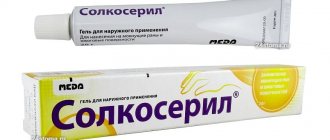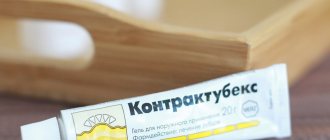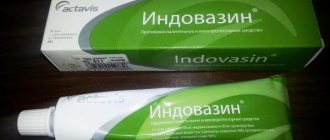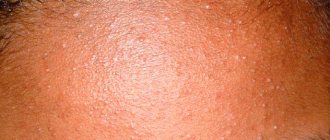A drug for the treatment of pain - domestic tablets Pentalgin. The manufacturer advertises them as a powerful pain reliever.
The chief physician of Cleveland Hospital, Josie Znidarich, is confident that the intensity of pain depends on the general condition of the body and the degree of damage. The most severe syndrome is with previous illnesses, a weakened body, and fear.
Pharmacodynamics and pharmacokinetics
The medicine has the following effects:
- antipyretic
- anti-inflammatory
- anesthetic
- pasmolytic
The substances included in the medication explain the therapeutic effect of Pentalgin.
Wikipedia states that paracetamol is an analgesic-antipyretic that can have analgesic and antipyretic effects. These effects are achieved thanks to the blockade of COX in the nervous system, affecting pain centers and thermoregulation.
Caffeine is a psychostimulant and helps dilate blood vessels in the muscles, kidneys and heart. Among other things, caffeine helps improve performance, reduce fatigue and tiredness, and provides a tonic effect.
The substance Naproxen provides the following actions:
- analgesic
- antipyretic
- anti-inflammatory
Pheniramine is a histamine H1 receptor blocker. Thanks to it, an antispasmodic and mild sedative effect occurs. The substance can improve the healing properties of paracetamol.
Drotaverine provides a myotropic antispasmodic effect.
Overdose
Using large dosages leads to:
- confusion
- tachycardia
- epilepsy
- excitement
- excessive concern
- anorexia
- pale skin
- pain in the abdomen
More dangerous signs of overdose include:
- coma
- death
- pancreatitis
- arrhythmia
- encephalopathy
- liver failure
If there are symptoms of overdose, it is important to perform gastric lavage, take activated charcoal and carry out symptomatic treatment.
Pentalgin or Tempalgin – which is better?
Manufacturer: Sopharma, Bulgaria
Release form: tablets
Active ingredient: metamizole sodium, triacetonamine-4-toluenesulfonate
An analogue of Pentalgin in tablets is the drug Tempalgin, consisting of an analgesic with antispasmodic activity metamizole sodium and an anxiolytic. It is used for various pains and spasms, produced by the Bulgarian pharmaceutical company Sopharma.
Pentalgin - 5 components without codeine, aimed at eliminating pain and spasms. Produced by the Russian manufacturer Pharmstandard (Kursk). Indications: any pain and spasms.
Patients often confuse Pentalgin and Tempalgin. The first drug is available in boxes of 12 and 24 oblong green tablets. Contraindicated in children. Tempalgin – green round tablets in blisters of 10 pieces, sold in boxes of 20 and 100 tablets. Can be used from 14 years of age.
Both drugs have proven themselves and effectively cope with pain. Not suitable for long-term use, more than 5 days. The cost of the analogue Pentalgin N is up to 3 times lower in terms of 10 tablets.
Whichever is stronger is better for menstruation and headaches individually. Depends on the nature and cause of the pain syndrome.
Side effect
It is possible that therapy with Pentalgin will cause certain negative effects:
- allergy
- changes in the functioning of the cardiovascular, digestive, nervous, and genitourinary systems
The above effects manifest themselves as:
- arrhythmias
- increase in pressure
- irregular heartbeat
- anemia
- skin rash
- itching
- headache
- tremor
- angioedema
- constipation
- erosive and ulcerative gastrointestinal disorders
Pentalgin or Nurofen – which is better?
Manufacturer: Reckitt Benckiser Healthcare, UK
Release form: capsules, tablets, suspension, suppositories, gel
Active ingredient: ibuprofen
Synonyms: Mig 400, Ibuprofen, Maxicold for children, Brufen, etc.
Pentalgin can be replaced with Nurofen if there is intolerance to the components, high blood pressure, or the patient is a child. The analogue Nurofen is used in pediatrics from 3 months in the form of suppositories and syrup; capsules and tablets differ in the dose of the active component, strength of action and speed.
Nurofen is used for toothache and headaches, diseases of the musculoskeletal system, and fever.
Pentalgin is more powerful because it contains 5 components. They enhance the therapeutic effect and allow you to reduce the dose of each component. Disadvantage: limited use in childhood.
Analogues in other dosage forms
On the pharmaceutical market there are drugs similar to Pentalgin, which are manufactured in the following dosage forms - gels and ointments, capsules, suppositories and oral suspensions.
Artrosilene
Artrosilene is an analgesic and a substitute for Pentalgin. The medicine is produced in several dosage forms - capsules, parenteral solution and gel, aerosol and suppositories. The active ingredient is ketoprofen lysine salt.
Artrosilene is prescribed after operations and injuries, as well as for the following pathologies:
- rheumatism of different localization;
- osteoarthritis and spondyloarthritis;
- gout and inflammatory processes in periarticular tissues;
- inflammation of various etiologies and locations in the musculoskeletal system.
Parenteral solution is used to relieve acute and severe pain.
Artrosilene is not used for:
- aspirin asthma;
- sensitivity to the ingredients of the medication;
- Crohn's disease;
- severe pathologies of the digestive system;
- hemophilia;
- renal dysfunction;
- pregnancy;
- lactation.
Dosage for oral use – 1 capsule once a day after meals. The medication course can last 90-120 days. For parenteral use - 2 administration procedures per day, 1 ampoule intravenously for 1-3 days. Further treatment can be continued with oral medication or rectal suppository therapy.
Adverse reactions can manifest themselves in the form of allergies, disorders of hematopoiesis and blood flow, in the functioning of the heart, central nervous system and gastrointestinal tract.
Ketonal
Ketonal is an analgesic medication that is produced in capsules and rectal suppositories, in tablets and in a solution for injections based on ketoprofen. Ketonal is used in therapy:
- arthritis and arthrosis;
- gout and spondyloarthritis;
- bursitis and tendonitis;
- dysmenorrhea.
The drug is also prescribed in the post-traumatic and post-operative periods.
Contraindications for use:
- intolerance to components in the medicine;
- peptic ulcers in the digestive system and non-ulcer dyspepsia;
- predisposition to bleeding;
- liver and kidney failure;
- bronchial asthma.
Also not used in the treatment of children under 14 years of age, women during lactation and pregnancy.
Oral dosage – 1-2 capsules (tablets) 2-3 times a day. Suppositories are used once a day, 1 suppository. The solution is used in a hospital setting 1-3 times a day, 0.1 g deep IM.
Adverse reactions:
- dyspepsia;
- anemia and dizziness;
- nosebleeds and petechiae;
- bronchospasms and urticaria.
OKI
OKI is an analgesic and a substitute for Pentalgin with anti-inflammatory and antipyretic properties. An analogue of Pentalgin is produced in suppositories, in solution, gel and in granules for the preparation of an oral suspension with the active ingredient - ketoprofen lysine salt.
Prescribed to adult patients and children with the following pathologies:
- rheumatoid etiology arthritis and spondyloarthritis;
- osteoarthritis and gout;
- otitis and diseases in the skeletal and muscular system.
A solution for topical use is prescribed for:
- ENT pathologies – sore throat, tonsillitis, laryngitis and pharyngitis;
- stomatitis and periodontal disease;
- glossitis and gingivitis;
- periodontopathy.
OKI is not prescribed for:
- hypovolemia;
- ulcerative and erosive destruction of the gastrointestinal tract;
- aspirin triad;
- intolerance to medicinal components;
- kidney problems and liver failure;
- open wounds and hemorrhoids (for suppositories and gel).
For adult patients and children over 14 years of age, it is necessary to take a double sachet of granules three times a day (1 dose - 80 mg), dissolved in 100 ml of water. For children 6-14 years old - dissolve half a packet (0.5 doses - 40 mg) in 100 ml of water, also 3 times a day.
Suppositories (1 suppository) are used 2-3 times a day. Solution for topical use – 2 rinses per day. Children need 1 injection of solution (2 ml), over 12 years old - 3 injections (6 ml), and adults 5 injections (10 ml). The solution must be diluted in a measuring cup and used for dental and ENT pathologies.
See also:
TOP 12 cheap analogues of Persen - substitutes for therapeutic effect
Pentalgin or Ibuprofen - which is better?
Manufacturer: Synthesis, Ozon, etc., Russia
Release form: tablets, capsules, gel, suspension
Active ingredient: ibuprofen
Ibuprofen is an anti-inflammatory, antipyretic and analgesic drug for use in children and adults. It is used for feverish syndrome and various pains.
Pentalgin is stronger. It is a combined analgesic and antispasmodic and is not used in children.
Pentalgin analogues that are cheaper or more expensive in price will not always be more effective. The choice of drug should be made based on the intensity of pain, previously used analgesics, and the age of the patient. Before purchasing, read the instructions and exclude contraindications. The maximum time for using an analgesic without a doctor’s prescription is up to 5 days, an antipyretic drug is up to 3 days.
Contraindications for taking Pentalgin
The pharmaceutical product is not prescribed for:
- intolerance to its components
- internal bleeding of the gastrointestinal tract
- arterial hypertension
- under 18 years of age
- peptic ulcers of the gastrointestinal tract
- pathologies of the heart and blood vessels
- pregnancy, breastfeeding (if pain occurs, pregnant and nursing mothers should consult a doctor to receive safe treatment)
- liver and kidney failure (severe form)
- bronchial asthma
- hyperkalemia
- undergone coronary artery bypass surgery
Doctors prescribe medication with caution for:
- diabetes mellitus
- viral hepatitis
- elderly patient
- liver damage and ethanol
- cerebrovascular pathologies
- mild to moderate forms of liver or kidney failure
- epilepsy
When is Pentalgin prescribed?
Indications for use of Pentalgin:
- neuralgia
- pain during menstruation
- migraine
- toothache
- joint or muscle pain
- algomenorrhea
- cold, in the presence of elevated body temperature
- post-operative or post-traumatic pain
- pain due to spasm of smooth muscles, caused by renal colic, cholelithiasis, chronic cholecystitis.
Reviews on the choice of Pentalgin analogues
Reviews about Pentalgin are positive. Patients and doctors note the high effectiveness of Pentalgin and its analogues in relieving various types of pain:
Dakhov A.V., therapist: “I prescribe Pentalgin to patients for acute headaches and migraines. It effectively copes with headaches of both vascular and neurotic origin. The drug does not cause severe side effects. Among the substitutes for Pentalgin, I can mention Spazmalgon, Sedal M and Ketanov. These analogues are also effective, but they are based on other active components.”
Yana, 35 years old: “I take Pentalgin in courses for exacerbation of neuralgia. The drug quickly relieves severe pain and completely restores my health in 2-3 days. It is a truly effective analgesic. “I tried to change it with Spazmalgon and Citramon, but they didn’t have such a good analgesic effect, so I returned to the original remedy.”
Pentalgin is an effective analgesic drug that is prescribed to relieve pain of any etiology. It can be taken as self-medication, but without a doctor’s prescription you should not take the drug for longer than 2-3 days. The doctor will prescribe the correct dosage and, if necessary, select effective and safe analogues.





